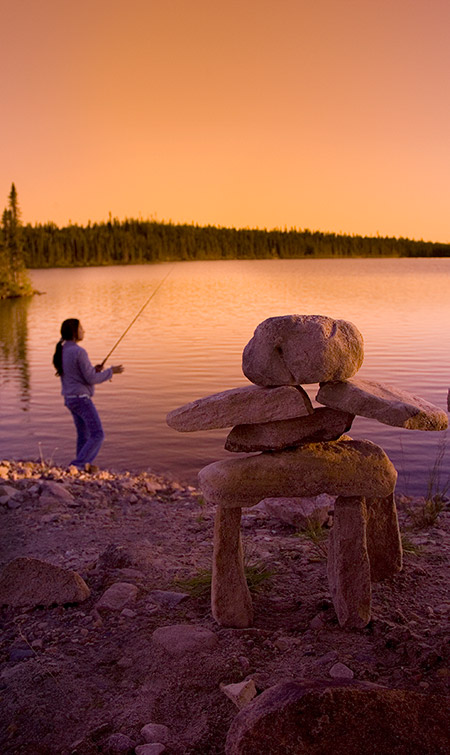Informing decisions using Indigenous knowledge

The tranquility of a fisherwoman and an Inukshuk at sunset
Meaningful engagement makes us a better regulator. It supports our recommendations to the Commission and contributes to improving safety and environmental protection and to resolving issues effectively. That is why we continue to transform how we work with Indigenous communities, recognizing that their unique cultures, knowledge and histories play a key role in our work.
A critical part of this engagement is the recognition and understanding of the important role Indigenous knowledge plays in our regulatory work. Indigenous knowledge and cultural context enhance our understanding of the potential impacts projects will have on the environment and communities. Working with and including Indigenous knowledge alongside regulatory information strengthens the rigour of our reviews, assessments and our regulatory oversight.
What is Indigenous knowledge?
Throughout Canada, there are more than 630 First Nations, 420 000 self-identified Métis, and 53 Inuit communities. This diversity means there are many definitions of Indigenous knowledge and each Indigenous community may have a different perspective on what Indigenous knowledge means for them and their culture.
The United Nations Educational, Scientific and Cultural Organization (UNESCO) defines Indigenous knowledge as the “understandings, skills and philosophies developed by societies with long histories of interaction with their natural surroundings.”
In short, Indigenous knowledge is knowledge that is unique to Indigenous peoples.
It encompasses knowledge about cultural, environmental, economic, health, political and spiritual inter-relationships. Indigenous knowledge must be considered and understood in the context of the language, perspectives and world views of the knowledge holders. It cannot be separated from such context. That is why the community and knowledge holders are the only ones who can decide if they are willing to provide access to their Indigenous knowledge.
How do we use Indigenous knowledge?
Our organization and staff work with Indigenous communities to understand and integrate their knowledge into our assessments and regulatory processes, including:
- licensing activities
- decommissioning
- the Independent Environmental Monitoring Program
- environmental reviews and risk assessments
- oral and written interventions at Commission proceedings
We are committed to pursuing meaningful reconciliation with Indigenous peoples and integrating their traditional knowledge into our regulatory work. Our staff have been working over the last 2 years in close consultation with the parties concerned to develop a framework for working with Indigenous knowledge to achieve an integrated approach, one that is based on collaboration with knowledge holders, as well as on consent, confidentiality and cultural respect.
Read our Indigenous Knowledge Policy Framework to learn more about how we approach Indigenous knowledge and apply it to our regulatory work.
Learn more about our approach to Indigenous engagement and how to contribute to our nuclear regulatory process.
Page details
- Date modified: